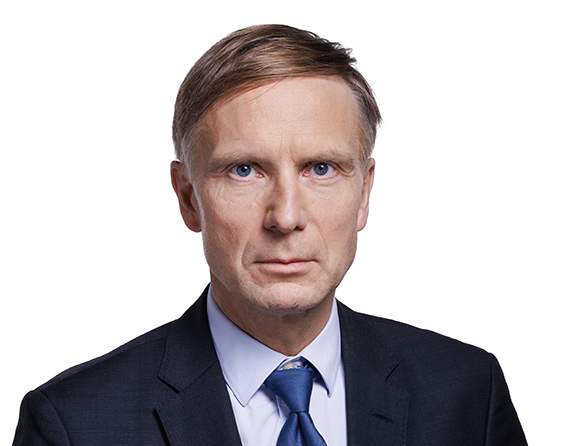
AI Profiling: Eerik-Niiles Kross
Agenda items: 9
290/290 profiling (100.0%)
Total Speeches: 97
Analysis Period: 2024-02-20 - 2025-03-26
Political Position
The political position is consistently very strong, value-based, and security-focused, centering on the active and uncompromising rejection of Russian aggression and autocratic tendencies in both foreign and domestic policy. The speaker demands decisive and often escalating action (e.g., sanctions against Georgia, non-recognition of the Putin regime), while simultaneously criticizing the slow reaction of the "old West." Domestically, he supports constitutional amendments (the introduction of a citizenship requirement for local elections), framing them as necessary to restore democratic sovereignty and revoke historical compromises that are inconsistent with the current security environment.
Topic Expertise
The speaker's expertise is concentrated in three core areas: international law and geopolitics (particularly the influence of Georgia and Russia), Estonian constitutional law, and Russian political and religious ideology. He consistently demonstrates profound historical depth, employing complex concepts (e.g., the Peace of Westphalia, *Russki Mir*) and making detailed references both to the work of the Estonian Constitutional Assembly and to international conventions (Geneva IV, the Genocide Convention). His expertise is evidence-based, relying on precise legal terminology, historical citations, and specific sources, which lends high authority to his analyses.
Rhetorical Style
The politician's rhetorical style is consistently formal, analytical, and historically grounded, focusing primarily on logical and legal arguments. The tone is predominantly serious and urgent, underscoring the gravity of the situation, but this is balanced by strategic optimism and, when necessary, emotionally charged historical analogies (e.g., the deportations). The speaker frequently employs historical parallels and narrative techniques to contextualize the subject matter, and sharply rejects opponents' demagogic attempts ("whataboutism"), preferring to keep the debate within a fact-based framework.
Activity Patterns
The politician's operational pattern is episodic, yet intensely focused on initiating and defending major legislative initiatives. They have repeatedly served as a representative for a broad group of Riigikogu members (49–61 members). The focus of their activities is clearly on foreign policy and raising awareness of crises, which is supported by active communication with the diplomatic corps and foreign travel (e.g., Hungary). In Riigikogu debates, they participate actively and thoroughly, demonstrating a deep procedural commitment, taking extra time when necessary, and engaging in extensive discussions across both the coalition and the opposition.
Opposition Stance
The politician's stance is multifaceted, yet it is defined by an intense and uncompromising opposition to the Russian Federation's regime, which stands accused of systematic war crimes, illegitimacy, and the propagation of the aggressive *Russki Mir* ideology. This geopolitical critique also extends to Georgia's ruling regime (Georgian Dream), which is viewed as undermining democracy and leaning toward Moscow, as well as to the "old West" for fracturing European unity and reacting too slowly to Russian aggression. The criticism itself is predominantly ideological, legal-political, and value-based, whereas domestic opposition tends to be procedural, focused on neutralizing the arguments of critics who challenge the organization of the legal framework or the timing of constitutional reforms.
Collaboration Style
The politician's style of cooperation is predominantly broad-based and cross-factional, evidenced by repeated initiatives that have garnered exceptionally wide support in the Riigikogu (up to 61 MPs, or 92% of the body) and successfully transcended partisan boundaries. He actively stresses the importance of consensus and compromise, viewing the resulting texts as successful agreements born from substantive debate. On the international stage, he focuses on promoting collective European action and unity, seeking consensus with the EU's major political families (EPP, Socialists, ALDE) as well as with regional partners.
Regional Focus
The politician's regional focus is predominantly international and geopolitical, systematically concentrating on Russian aggression and the security of the South Caucasus and Eastern Europe (Ukraine, Georgia). National topics primarily concern sovereignty and constitutional issues, addressing Estonia's role within the global security zone. A specific local or regional focus is almost entirely absent; local locations (e.g., Narva, Sillamäe) or communities are used merely to illustrate the broader narrative of defending national security or the space of shared values.
Economic Views
The politician's economic policy positions are largely unclear, as most periods reflect a lack of available data. The only topic that stands out (February 2025) relates to strategic budgeting and European autonomy, stressing a readiness to pay for security and the necessity of funding intra-European programs to safeguard European interests. This points to a priority concerning strategic expenditure, but direct stances on taxation, regulation, trade, or budgetary discipline are entirely absent.
Social Issues
The politician's social profile is predominantly focused on the protection of international human rights and civil society, condemning systemic violence, the existence of political prisoners, and the destruction of children's cultural identity. Domestically, the profile primarily focuses on eliminating the legacy of occupation and regulating the voting rights of non-citizens, emphasizing the principle of legal certainty and supporting integration. On issues of religious freedom, emphasis is placed on the need to protect the right of congregations to choose their affiliation, balancing this with the state's need to provide a political assessment of institutions that incite aggression. Typical domestic culture war topics (such as trans rights) are, in this context, dismissed as irrelevant demagoguery.
Legislative Focus
The politician's legislative focus was clearly divided into two distinct fronts: the forceful shaping of Estonia's foreign policy stance through Riigikogu statements condemning authoritarian regimes (Russia, Georgia's de facto government) and demanding the enforcement of international law, and domestic constitutional reform. He was consistently an active initiator and supporter, successfully concluding a constitutional amendment that introduced a citizenship requirement for local elections, thereby restricting the voting rights of non-citizens. In both the foreign policy statements and the citizenship-related amendment, the inevitability and historical importance of the actions were strongly emphasized.